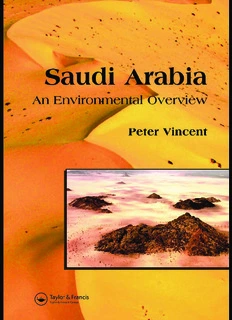
Saudi Arabia: An Environmental Overview PDF
Preview Saudi Arabia: An Environmental Overview
Saudi Arabia: An Environmental Overview Saudi Arabia: An Environmental Overview Peter Vincent This edition published in the Taylor & Francis e-Library, 2008. “To purchase your own copy of this or any of Taylor & Francis or Routledge’s collection of thousands of eBooks please go to www.eBookstore.tandf.co.uk.” Taylor & Francis is an imprint of the Taylor & Francis Group ,an informa business © 2008 Taylor & Francis Group, London, UK All rights reserved. No part of this book may be reprinted or reproduced or utilized in any form or by any electronic, mechanical, or other means, now known or hereafter invented, including photocopying and recording, or in any information storage or retrieval system, without permission in writing from the publishers. Although all care is taken to ensure integrity and the quality of this publication and the information herein, no responsibility is assumed by the publishers nor the author for any damage to the property or persons as a result of operation or use of this publication and/or the information contained herein. Published by: Taylor & Francis/Balkema P.O. Box 447, 2300 AK Leiden, The Netherlands e-mail: [email protected] www.balkema.nl, www.taylorandfrancis.co.uk, www.crcpress.com Library of Congress Cataloging-in-Publication Data Saudi Arabia: an environmental overview/Peter Vincent. p. cm. Includes bibliographical references and index. ISBN 978-0-415-41387-9 (hardcover: alk. paper) 1. Saudi Arabia–Environmental Conditions. I. Vincent, Peter. GE160.S32V56 2008 363.7009538–dc22 2007024276 ISBN 0-203-03088-5 Master e-book ISBN ISBN 978-0-415-41387-9 (Hbk) ISBN 978-0-203-03088-2 (eBook) Contents List of Figures ix List of Tables xiii Preface xvii Acknowledgments xxi 1 An environment discovered 1 1.1 Introduction 1 1.2 Early European explorers 2 1.3 The nineteenth century 2 1.4 Twentieth century explorers 9 2 The Kingdom 17 2.1 Introduction 17 2.2 Main physiographic regions 19 2.3 A journey through time 29 2.4 The modern Kingdom – growing environmental pressures 35 3 Geological framework 45 3.1 Introduction 45 3.2 Brief geological history 48 3.3 Regional geology 54 3.4 Economic geology 62 vi Contents 4 Climate and environmental change 67 4.1 Introduction 68 4.2 Synoptic climatology and seasons 69 4.3 Air temperature 71 4.4 Atmospheric humidity and evaporation 72 4.5 Precipitation 75 4.6 Global radiation and sunshine 79 4.7 Winds 80 4.8 Climatic regions 80 4.9 Quaternary climatic and environmental change 84 5 Hydrogeology and hydrology 95 5.1 Introduction 95 5.2 The drainage net 97 5.3 Surface runoff 98 5.4 Dams 101 5.5 Lakes 102 5.6 Springs 104 5.7 Groundwater 105 5.8 Aquifer water quality 108 5.9 Aquifer recharge 109 5.10 Water extraction for irrigation 111 5.11 Urban development and groundwater 113 5.12 Water harvesting in urban areas 115 6 Geomorphology 117 6.1 Introduction 118 6.2 Weathering 118 6.3 Denudation history 121 6.4 Tertiary drainage development 131 Contents vii 6.5 Deep weathering and stripping 132 6.6 Inselbergs 133 6.7 Pediment development and gravel plains 133 6.8 Alluvial fans 133 6.9 Sand deserts and dunes 134 6.10 Wind erosion 147 6.11 Karst 150 6.12 Volcanic landforms 153 6.13 Escarpments and cuestas 155 6.14 Quaternary sea level change 157 6.15 Loessic alluvial silts 162 7 Biogeography 163 7.1 Introduction 163 7.2 The fauna 165 7.3 The flora 172 7.4 Vegetation 178 8 Soils and soil erosion 189 8.1 Introduction 190 8.2 Entisols 191 8.3 Inceptisols 197 8.4 Aridisols 197 8.5 Soil map associations 202 8.6 Soil mineralogy 207 8.7 Palaeosols 208 8.8 Soil erosion 212 9 Environmental impacts and hazards 215 9.1 Introduction 216 viii Contents 9.2 Geohazards 216 9.3 Biological hazards 233 9.4 Industrial hazards 236 9.5 Soil salinization and irrigation 238 9.6 Desertification 239 9.7 Gulf War hazards 245 10 Environmental protection, regulation and policy 247 10.1 Introduction 247 10.2 Islam and the environment 249 10.3 The legal background 251 10.4 Meteorology and Environmental Protection Administration (MEPA) 254 10.5 The Ministry of Agriculture 256 10.6 National Commission for Wildlife Conservation and Development (NCWCD) 260 10.7 Traditional land management – hima (sometimes hema) 273 10.8 Eco- and geotourism 278 References 281 Index 299 List of Figures 1.1 The Arabian journeys of Captain George Sadlier, Charles Montagu Doughty and Sir Wilfred and Lady Anne Blunt. 4 1.2 The little palace in Jubbah where the Blunts rested during their crossing of An Nafud. 6 1.3 Nabataean tombs at Madain Salih. 7 1.4 Al Ula as it was in Doughty’s time – now abandoned. 8 1.5 Gertrude Bell. 10 1.6 Harry Saint John Bridger Philby. 11 1.7 Travels into ar Rub’ al Khali by Thomas, Philby and Thesiger. 12 1.8 Bertram Thomas – the first explorer to cross the Empty Quarter. 13 1.9 William Thesiger. 14 2.1 General topography of the Arabian Peninsula. 18 2.2 Main physiographic regions of the Arabian Peninsula. 20 2.3 Flight of raised beaches north of Umm Lajj. 21 2.4 Young and old lavas on Harrat Khaybar north-east of Madinah. 22 2.5 Petroglyph at Jubbah. 24 2.6 Red Sea Escarpment west of Abha. 25 2.7 The spectacular canyon of Wadi Labj. 26 2.8 Tuwaiq Escarpment north of Wadi ad Dawasir. 27 2.9 Crystalline Nadj uplands 100 km west of Unayzah. 29 2.10 Homo erectus routes into Arabian Peninsula from Africa. 30 2.11 Administrative regions of the Kingdom. 38 3.1 Geological Map of the Arabian Peninsula. 46 3.2 The Arabian Plate. 47 3.3 Age distribution of dated Precambrian rocks. 50
Description: